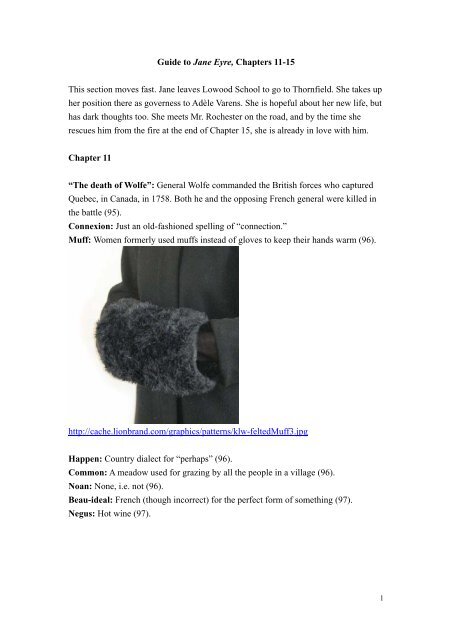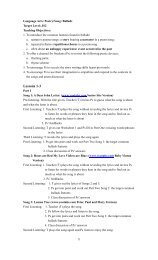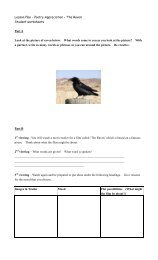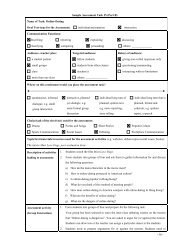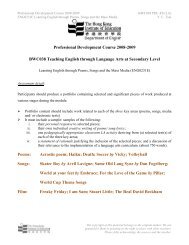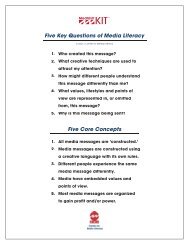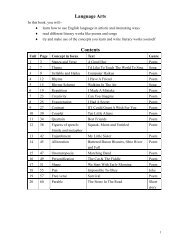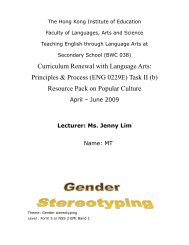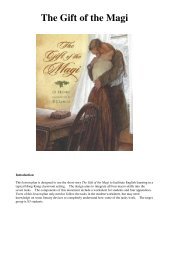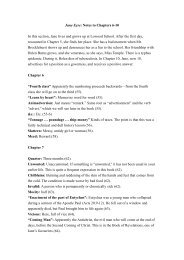You also want an ePaper? Increase the reach of your titles
YUMPU automatically turns print PDFs into web optimized ePapers that Google loves.
<strong>Guide</strong> <strong>to</strong> <strong>Jane</strong> <strong>Eyre</strong>, <strong>Chapters</strong> <strong>11</strong>-<strong>15</strong><br />
This section moves fast. <strong>Jane</strong> leaves Lowood School <strong>to</strong> go <strong>to</strong> Thornfield. She takes up<br />
her position there as governess <strong>to</strong> Adèle Varens. She is hopeful about her new life, but<br />
has dark thoughts <strong>to</strong>o. She meets Mr. Rochester on the road, and by the time she<br />
rescues him from the fire at the end of Chapter <strong>15</strong>, she is already in love with him.<br />
Chapter <strong>11</strong><br />
“The death of Wolfe”: General Wolfe commanded the British forces who captured<br />
Quebec, in Canada, in 1758. Both he and the opposing French general were killed in<br />
the battle (95).<br />
Connexion: Just an old-fashioned spelling of “connection.”<br />
Muff: Women formerly used muffs instead of gloves <strong>to</strong> keep their hands warm (96).<br />
http://cache.lionbrand.com/graphics/patterns/klw-feltedMuff3.jpg<br />
Happen: Country dialect for “perhaps” (96).<br />
Common: A meadow used for grazing by all the people in a village (96).<br />
Noan: None, i.e. not (96).<br />
Beau-ideal: French (though incorrect) for the perfect form of something (97).<br />
Negus: Hot wine (97).<br />
1
Chintz: A kind of flower pattern popular then (99). Here is a chintz plate:<br />
http://reviews.ebay.com/Tableware-His<strong>to</strong>ry-CHINTZ-Royal-Win<strong>to</strong>n-Kent-amp-MOR<br />
E_W0QQugidZ1000000000090<strong>11</strong>19<br />
Thorns (99, 100):<br />
http://www.alicewebb.com/ThroughTheThornsTmp18.JPG<br />
Want: lack (100).<br />
Quaker-like: Quakers make up a Christian denomination committed <strong>to</strong> nonviolence<br />
and plainness. Today, they dress like anybody, but then they looked like this:<br />
2
www.trousseau.net/trousseau2.asp?P=2&I=219<br />
“A gentleman’s manor-house not a nobleman’s seat”: The number of people who<br />
actually had noble titles was small, and many of those few were extremely rich. A<br />
gentleman necessarily had money, but not as much as a nobleman typically would.<br />
A gentleman’s manor-house:<br />
http://www.maggiesale.ca/The%20Lune%20Valley/images/03%20Manor%20House%<br />
20adj.jpg<br />
3
A nobleman’s seat:<br />
Belvior Castle<br />
http://www.mel<strong>to</strong>nonline.co.uk/ppimageupload/image165.JPG<br />
Rook:<br />
http://www.b<strong>to</strong>.org/birdtrends2003/images/rook01GHH300w.jpg<br />
Rookery: A collection of rooks’ nests (101).<br />
Proprie<strong>to</strong>r: Owner. Compare “propriety” (101).<br />
Ward: A child that a person takes care of, who may not be a relative (102).<br />
“A redundancy of hair”: More hair than is really necessary. Compare “excrescence”<br />
earlier (102).<br />
“C’est la gouvernante?” Is that the governess? (102).<br />
4
“Mais oui, certainement.” Yes, certainly (102).<br />
“She is gone <strong>to</strong> the Holy Virgin”: This means she’s dead, of course, but the way it is<br />
put is very Catholic, and would be strange <strong>to</strong> English Protestants (103).<br />
Hazel eyes: green-brown eyes (103).<br />
Naïveté: Innocence (104).<br />
La Fontaine: The seventeenth-century author of many French poetic versions of<br />
fables, some from Aesop and some invented. The talking animals make them seem<br />
childish, but the morals are far from naïve, and are even cynical (104).<br />
Boudoir: A small room with elegant furnishings for a lady (105). The word occurs<br />
again later, where it is a lady’s bedroom. The room is red and white, perhaps <strong>to</strong><br />
emphasize the brightness of this world in contrast <strong>to</strong> the greyness of Lowood.<br />
“Time out of mind”: As far back as anyone can remember.<br />
Unimpeachable: Not open <strong>to</strong> criticism. This differs very much from his own account<br />
of himself later (106).<br />
“You cannot always be sure whether in jest or in earnest”: A very English way of<br />
joking is <strong>to</strong> remain very serious, in an effort <strong>to</strong> persuade your listener that you are not<br />
joking at all. This is sometimes very funny (106).<br />
“After life’s fitful fever they sleep well”: From Shakespeare’s Macbeth. Macbeth<br />
has murdered King Duncan so that he can be king. When he is king, he finds that he is<br />
not secure or happy in his position. He says:<br />
Duncan is in his grave;<br />
After life's fitful fever he sleeps well;<br />
Treason has done his worst: nor steel, nor poison,<br />
Malice domestic, foreign levy, nothing,<br />
Can <strong>to</strong>uch him further. (Act 3, Scene 2, Lines 22-26)<br />
Since he has committed a murder, in short, his own life is so bad that he envies a dead<br />
man. Perhaps it is significant that there are three witches in the play (107).<br />
Crow colony: Strictly speaking, rooks are of a different species from crows, but <strong>Jane</strong><br />
does not make the distinction (107).<br />
“Like a corridor in some Bluebeard’s castle”: “Bluebeard” is a rather horrifying<br />
fairy tale, in which a young woman marries a strange man named Bluebeard. No one<br />
else will marry him because his blue beard makes him ugly. He tells her what rooms<br />
the keys are for, but forbids her <strong>to</strong> enter a certain room. When she enters it, she finds<br />
that it is full of blood, and she sees the dead bodies of Bluebeard’s former wives. She<br />
drops the key in<strong>to</strong> the blood, and is unable <strong>to</strong> clean it. On Bluebeard’s return, he sees<br />
the blood and tells the wife she must die, but her brothers arrive just in time <strong>to</strong> save<br />
5
her. Read the s<strong>to</strong>ry at http://www.pitt.edu/~dash/type0312.html<br />
“The laugh was tragic”: If you try <strong>to</strong> produce a tragic laugh, you will find it is a<br />
challenge. Nevertheless, such things do exist (108).<br />
“Mesdames, vous êtes servies!...J’ai bien faim, moi!”: Ladies, dinner is served! I’m<br />
very hungry!<br />
Chapter 12<br />
Par parenthèse: By the way (between parentheses) (<strong>11</strong>0).<br />
Porter: Black beer. Guinness is porter (<strong>11</strong>2).<br />
“Revenez bientôt, ma bonne amie, ma chère Mdlle Jeannette”: Come back soon,<br />
my good friend, my dear Miss <strong>Jane</strong>t (<strong>11</strong>2).<br />
Stile: A place in a fence with steps so that people can climb over it (<strong>11</strong>3).<br />
http://econoclectic.powerblogs.com/files/econoclectic-SixPenceUponStile.jpg<br />
Causeway: A sort of raised road out of earth and gravel <strong>to</strong> cross a pond or a wet place<br />
(<strong>11</strong>3).<br />
Pretercanine: Not naturally like a dog. Charlotte Brontë seems <strong>to</strong> have invented the<br />
word for this occasion (OED) (<strong>11</strong>4).<br />
Deuce: A euphemism for “devil” (<strong>11</strong>6).<br />
“The mountain will never be brought <strong>to</strong> Mahomet”: IF THE MOUNTAIN WILL<br />
NOT COME TO MOHAMMED, MOHAMMED WILL GO TO THE MOUNTAIN -<br />
"If one cannot get one's own way, one must adjust <strong>to</strong> the inevitable. The legend goes<br />
that when the founder of Islam was asked <strong>to</strong> give proofs of his teaching, he ordered<br />
Mount Safa <strong>to</strong> come <strong>to</strong> him. When the mountain did not comply, Mohammed raised<br />
his hands <strong>to</strong>ward heaven and said, 'God is merciful. Had it obeyed my words, it would<br />
have fallen on us <strong>to</strong> our destruction. I will therefore go <strong>to</strong> the mountain and thank God<br />
that he has had mercy on a stiff-necked generation.' The saying has been traced back<br />
in English <strong>to</strong> 'Essays,' (1625) by English philosopher Frances Bacon (<strong>15</strong>61-1626). It<br />
6
was included in John Ray's book of English proverbs in 1678." From "Random House<br />
Dictionary of Popular Proverbs and Sayings" (1996) by Gregory Y. Titelman<br />
(Random House, New York, 1996). The phrase is still current (<strong>11</strong>6).<br />
“an incident of no moment”: Moment, here, means weight, importance (<strong>11</strong>7).<br />
Chapter 13<br />
“coined pretexts”: To coin is <strong>to</strong> make fake money, or counterfeit. To coin pretexts is<br />
<strong>to</strong> invent excuses that have no reality (120).<br />
Ami: friend (masculine).<br />
“Et cela doit signifier … qu’il y aura là-dedans un cadeau pour moi, peut-être<br />
pour vous aussi, mademoiselle. Monsieur a parlé de vous : il m’a demandé le<br />
nom de ma gouvernante, et si ce n’était pas une petite personne, assez mince et<br />
un peu pâle. J’ai dit qu’oui : car c’est vrai, n’est-ce pas, mademoiselle?” And that<br />
must mean that there will be a present for me in the box, and maybe for you <strong>to</strong>o, Miss.<br />
Sir talked about you: he asked me the name of my governess, and whether she wasn’t<br />
a little person, rather thin and a bit pale. I said yes, because it’s true, isn’t it, Miss?<br />
(120)<br />
“In the clear embers I was tracing a view”: <strong>Jane</strong> is looking in<strong>to</strong> the fire, and using<br />
the poker (a sort of heavy metal bar with a handle) <strong>to</strong> draw a picture of a castle in<br />
Germany with flaming coals (121).<br />
“Dress for the evening”: To “dress for dinner” is <strong>to</strong> put on formal “evening clothes”:<br />
www.blacktieguide.com/His<strong>to</strong>ry/1800s.htm<br />
These clothes are actually later than our period, but you get the idea (121).<br />
“Wax candles … superb fire”: Contrasts with the rushlight and scanty fire of<br />
Lowood School (121).<br />
http://trulyvic<strong>to</strong>ri<br />
an.netfirms.com/<br />
his<strong>to</strong>rypages/77i<br />
mg2.jpg<br />
7
“Decisive nose”: Alongside phrenology, which we have seen, the Vic<strong>to</strong>rians had a<br />
“science” called “physiognomy” which consisted in learning people’s characters from<br />
the shapes of their faces. I’m not very sure what a decisive nose would look like,<br />
except that it might be large (121).<br />
“good figure”: It’s interesting <strong>to</strong> notice that this expression, now exclusively applied<br />
<strong>to</strong> women, used <strong>to</strong> apply <strong>to</strong> men as well (121-2).<br />
Caprice: Random whims (122).<br />
Piquant: Full of flavour (122).<br />
“N’est-ce pas, monsieur, qu’il y a un cadeau pour Mademoiselle <strong>Eyre</strong> dans votre<br />
petit coffre? ”: Isn’t it true, Sir, that there is a present for Miss <strong>Eyre</strong> in your little box?<br />
(122)<br />
Cadeaux: Presents (122).<br />
“Beat about the bush”: Talk about everything but the real point (123).<br />
Deserts: (pronounced deZERTS) What a person deserves (123).<br />
Meed: Reward. We’ve seen this one before (123).<br />
Chiffonière:<br />
http://www.heironsmith.com.au/images/Achiff.gif<br />
Tenacious: Holding hard <strong>to</strong> something, not giving up (123).<br />
Constitution: A person with a strong constitution will not get ill easily (123).<br />
Fairy tales: The fairy tales that have come up in the s<strong>to</strong>ry recently are not<br />
encouraging : Bluebeard, the gytrash, and the three witches from Macbeth (123).<br />
Men in green: Meaning mythical little people, fairies or leprachauns (124).<br />
“One of your rings” Fairy rings are rings of mushrooms, supposed <strong>to</strong> be the places<br />
where fairies dance. According <strong>to</strong> the s<strong>to</strong>ries, if a person stumbles in<strong>to</strong> a fairy ring<br />
while the fairies are dancing, he is cursed.<br />
8
http://upload.wikimedia.org/wikipedia/commons/thumb/e/e3/Fairy_Ring.jpg/800px-F<br />
airy_Ring.jpg<br />
Foresook : Past tense of forsake, meaning leave, abandon (124).<br />
“Eulogiums”: A formal speech of praise. One hears a eulogy at a funeral (124).<br />
“Felling my horse”: One fells a tree with an axe. This is a metaphor, making <strong>Jane</strong> out<br />
<strong>to</strong> be violent and powerful (124).<br />
Religieuses : Nuns (French) (125).<br />
Blasphemous: Insulting <strong>to</strong> God (125).<br />
“the head and front of his offending”: Shakespeare again, from Othello. Othello is<br />
accused of using witchcraft <strong>to</strong> persuade Desdemona <strong>to</strong> run away with him. He says:<br />
That I have ta'en away this old man's daughter,<br />
It is most true; true, I have married her:<br />
The very head and front of my offending<br />
Hath this extent, no more. (Act 1 Scene 3 Lines 78-81)<br />
“Features and countenance are so much at variance”: Rochester means that her<br />
face looks young, but its expression looks older (125).<br />
“The first … swollen sea”: We see the Romantic love of s<strong>to</strong>rms here, and the s<strong>to</strong>rm<br />
9
in <strong>Jane</strong>’s picture goes with a number of s<strong>to</strong>rms in the “real” world of the novel (127).<br />
“A woman’s shape”: The woman represents the Evening Star, that is, the planet<br />
Venus as it appears in the evening before other stars come out (127).<br />
“A colossal head”: The shape seems <strong>to</strong> be of a Scandinavian god, as the Romantics<br />
loved northern literature, but not one that we can name from knowing the s<strong>to</strong>ries<br />
(127).<br />
Latmos: A mountain now in Turkey, where there is a ruined ancient Greek city.<br />
Rochester must indeed have travelled widely if he has seen it (128).<br />
Chapter 14<br />
“Amuse yourself with disembowelling it”: An implied metaphor. Bowels are the<br />
intestines of a person or animal. Rochester is comparing Adèle <strong>to</strong> a flesh-eating<br />
animal like a hyena (130).<br />
“Tiens-<strong>to</strong>i tranquille, enfant; comprends-tu?” Keep quiet child; do you<br />
understand?<br />
“Oh, ciel! Que c’est beau!”: Oh, heavens! It’s beautiful!<br />
“tête-à-tête”: “Head <strong>to</strong> head” i.e. in one-on-one conversation.<br />
Brat: Badly behaved child, or an insulting term for any child.<br />
Lustre: Chandelier (it is called by this name on p. 134):<br />
http://www.art-et-cristal.com/6-lustres/lustre-01-282x424.jpg<br />
10
Damask: Silk with a pattern like this:<br />
http://www.sewmamasew.com/media/ccp0/prodlg/spa_damask300.jpg<br />
Nonnette: Little nun. Not a common word even in French (132).<br />
Suave: Sweet, in this context, but usually refers <strong>to</strong> a man who is agreeable and<br />
confident (133).<br />
Philanthropist: One who loves the human race (133).<br />
Pervious: Permeable, that is, capable of being penetrated by water, or something like<br />
it. Bricks are permeable. Glass is not (133).<br />
Dumb: Unable <strong>to</strong> speak. The sense of this word as “stupid” came about later than this<br />
book, and is slang rather than formal English (134).<br />
“Et j’y tiens”: And this is important <strong>to</strong> me.<br />
“Indifferent, not <strong>to</strong> say bad”: “Indifferent,” as we have seen before, means “less<br />
than good.” “Not <strong>to</strong> say bad” suggests that he knows “bad” might be more accurate,<br />
but he doesn’t want <strong>to</strong> say so (135).<br />
Piqued: Offended (135).<br />
“God wot”: God knows (poetic) (136).<br />
“Bilge water”: literally, the water that you find in the lowest part of a wooden ship,<br />
which is filthy (136).<br />
“trite … hackneyed”: Words most often applied <strong>to</strong> styles of writing. If you write as<br />
others do, with no personality or imagination, your writing will be trite and hackneyed<br />
(137).<br />
“Paltry ribaldry”: Ribaldry is obscene or indecent language. Paltry means minor,<br />
unimportant, contemptible (137).<br />
Remorse: What you feel about the wrong things you have done (137).<br />
<strong>11</strong>
Cameo head (137):<br />
http://www.royalcollection.org.uk/egallery/images/collection_large/65238.jpg<br />
“Devil … angel of light”: Still referring <strong>to</strong> pleasure (138).<br />
“A fallen seraph of the abyss”: A reference <strong>to</strong> the s<strong>to</strong>ry of Lucifer, who was an angel,<br />
but rebelled against God and became Satan, the Devil. A seraph is a kind of angel<br />
(138).<br />
“Messenger from the eternal throne”: The word “angel” means “messenger,” and<br />
apparently Rochester knows this (138).<br />
“Disguised deity”: There are many old s<strong>to</strong>ries about people who <strong>to</strong>ok a stranger in<strong>to</strong><br />
their house and afterwards found that the stranger was a god or an angel. One of the<br />
more famous ones is the s<strong>to</strong>ry of Philemon and Baucis (138).<br />
“Paving hell … good intentions”: A reference, which <strong>Jane</strong> doesn’t catch at first, <strong>to</strong><br />
the proverb “The road <strong>to</strong> hell is paved with good intentions.” That is, the worst events<br />
come about because people try <strong>to</strong> do the right thing. Rochester is suggesting that he<br />
will try <strong>to</strong> do right, but thinks he will end up in hell anyway (138).<br />
“Pure ore … foul dross”: In mining, “ore” is the s<strong>to</strong>ne that contains the precious<br />
metal, and “dross” is the s<strong>to</strong>ne that is thrown away (139).<br />
“Medes and Persians”: A reference <strong>to</strong> the Bible (Daniel 6:8). The laws of the Medes<br />
and Persians were said <strong>to</strong> be unchangeable (139).<br />
“New statute”: A statute is a new law passed by Parliament. <strong>Jane</strong> is objecting that<br />
this law cannot be unalterable, because he has just now altered it (139).<br />
“I swear by my household gods”: The ancient Romans kept gods in a shrine in their<br />
house, much as Taoists do now, with statues of the gods of the house (139).<br />
12
Sphinx: A mythical animal in ancient Greek mythology. The Sphinx of Thebes asked<br />
a riddle of every traveller who came by, and if the traveller could not answer it, she<br />
would kill him (139).<br />
personal.bgsu.edu/~jmpfund/Aenigmata.html<br />
Enigmatical: Riddling (139).<br />
Austere: “Grave, sober, serious” (OED) (139).<br />
“Il faut que j’essaie … et l’instant même”: I must try it right now (140).<br />
“Est-ce que ma robe me va bien? … et mes souliers? et mes bas? Tenez, je crois<br />
que je vais danser”: Does my dress suit me? And my shoes? And my s<strong>to</strong>ckings? Wait,<br />
I think I’m going <strong>to</strong> dance (140).<br />
“Monsieur, je vous remercie mille fois de votre bonté … C’est comme cela que<br />
maman faisait, n’est-ce pas, monsieur?”: Sir, I thank you a thousand times for your<br />
goodness … That’s what Mama used <strong>to</strong> do, isn’t it, sir? (140)<br />
“comme cela”: Like that (140).<br />
Green: Immature, lacking judgement. Vernal is also green, with a suggestion of<br />
spring (141)<br />
“French floweret … root … blossom”: An extended metaphor of Adèle as flower.<br />
To manure a flower is <strong>to</strong> put excrement on it <strong>to</strong> help it <strong>to</strong> grow—but he decides that it<br />
is only an artifical flower, not a real one (141).<br />
“Expiating numerous sins … by one good work”: In the Catholic church, a person<br />
confesses <strong>to</strong> the priest, who assigns some sort of task <strong>to</strong> gain God’s forgiveness. For<br />
small sins, one says prayers a certain number of times, but for great sins, one might<br />
have <strong>to</strong> do something large and virtuous. He specifies that this is a Catholic principle,<br />
13
ecause Protestants think otherwise, and he and <strong>Jane</strong> are both Protestant (141).<br />
Chapter <strong>15</strong><br />
“Shuttlecock”: A badmin<strong>to</strong>n bird (142).<br />
http://www.gasolinealleyantiques.com/sports/images/miscellaneous/shuttlecock1.JPG<br />
“Taille d’athlète”: Taille means “height,” but Céline seems <strong>to</strong> mean “athletic build.”<br />
“Apollo Belvedere”: A famous statue, showing an ideal male body.<br />
14
http://faculty.washing<strong>to</strong>n.edu/nh2/classes/apollo.jpg<br />
“Gallic sylph … British gnome”: References <strong>to</strong> mythical beings. Gallic means<br />
“French.” A sylph is an air spirit, and the term is used for a slender, attractive woman:<br />
http://tarot.indeep.ru/minors/V_Asw.jpg<br />
A gnome is a small, ugly male figure, like a dwarf:<br />
http://i2<strong>11</strong>.pho<strong>to</strong>bucket.com/albums/bb224/dbarsne/gnome_MJ_large.jpg<br />
Gnomes are more of a joke than any kind of serious myth. Some people have little<br />
statues of gnomes in their gardens (142).<br />
Hotel: Not a hotel in the modern sense, but a big house in the city (142).<br />
Cashmeres: Clothes made of very fine wool from Kashmir, India (142).<br />
Dentelles: Lace (142).<br />
<strong>15</strong>
“Ruining myself in the received style”: A man ruins himself by spending all his<br />
money and reducing himself <strong>to</strong> poverty and/or by ruining his good reputation. “In the<br />
received style” means in the normal, conventional way, the way everybody knows. In<br />
short, his life is trite and hackneyed (142).<br />
Spoony: A silly person, especially a fool for love (142).<br />
Gaslight: At the time, streetlamps had gas flames (142).<br />
Croquant: Eating (142).<br />
Barbarism: He is using the French grammatical form incorrectly. The apology<br />
involves a delicate compliment <strong>to</strong> <strong>Jane</strong>, because he is showing that he knows she will<br />
see the mistake, that he knows she will care, and that he cares <strong>to</strong> show her that he<br />
understands the issue (142).<br />
“Mon ange”: My angel (143).<br />
“Spurred heel”: Only a man would wear spurs (143):<br />
http://www.horsebugstuff.com/assets/images/Spur_Holders.jpg<br />
“Porte cochère”: Coachman’s door, that is, the side door (143).<br />
“You never felt jealousy, did you, Miss <strong>Eyre</strong>?” She will shortly, and perhaps he<br />
already intends <strong>to</strong> make her feel it (143).<br />
“Rocks … breakers … channel … whirl and tumult … crag points”: An extended<br />
metaphor, suggesting this (143):<br />
16
“Sky of steel”: The sky is overcast with clouds (143).<br />
“A hag like one of those who appeared <strong>to</strong> Macbeth”: At the beginning of<br />
Shakespeare’s Macbeth, Macbeth meets three witches, who predict he will be King of<br />
Scotland. They lead him on <strong>to</strong> commit his murders (144):<br />
http://www.theoldglobe.org/images/newsletter/Macbeth2.jpg<br />
“Job’s leviathan”: A monster from the Bible (Job 41)(144):<br />
http://content.answers.com/main/content/wp/en/thumb/4/4a/250px-Destruction_of_Le<br />
viathan.png<br />
“Passing strange”: A rather Shakespearean turn of phrase that means “at least a little<br />
strange”(144).<br />
Blight: A plant disease that causes plants <strong>to</strong> dry up (145).<br />
Roué: An irresponsible, dissolute man (145).<br />
Vicomte: A viscount (kind of nobleman)(145).<br />
“beauté mâle”: Male beauty, but the word mâle is usually applied <strong>to</strong> animals (145).<br />
17
“The contrast struck me”: Does he love <strong>Jane</strong> because she is different from Céline?<br />
(145)<br />
Abridge: Make a long s<strong>to</strong>ry short (145).<br />
“A meeting at the Bois de Boulogne”: That is, a duel, in this case with pis<strong>to</strong>ls. The<br />
Bois de Boulogne is a wooded park then on the outskirts of Paris (146).<br />
Fillette: French for little girl (146).<br />
“Mrs Fairfax found you <strong>to</strong> train it”: Why does he use “it” here rather than “her”?<br />
“Disowned by you, sir”: <strong>Jane</strong> seems <strong>to</strong> be assuming that Rochester is Adèle’s father,<br />
and won’t admit it. The “sir” seems ironic (146).<br />
Hauteur: French for “Highness,” that is, pride (147).<br />
Relish: Strong pleasure (also a verb) (147).<br />
“Thin-crescent destiny”: She imagines her destiny as the moon, first a crescent, and<br />
now growing (147):<br />
http://img2.travelblog.org/Pho<strong>to</strong>s/5703/93701/t/600677-Crescent-moon--Luna-crecien<br />
te-0.jpg<br />
Sardonic: Sarcastic (148).<br />
Fulminating: Thundering (<strong>15</strong>0).<br />
Anathemas: Curses. This word will come up again (<strong>15</strong>0).<br />
Credi<strong>to</strong>r: A person <strong>to</strong> whom one owes something, usually money, but here gratitude<br />
(<strong>15</strong>2).<br />
Genii: Here, just “spirits” rather than more specifically Arab spirits (<strong>15</strong>2).<br />
“Hills of Beulah”: There is a brief reference <strong>to</strong> the blessed land of Beulah in the<br />
Bible, but the immediate reference is probably <strong>to</strong> John Bunyan’s Pilgrim’s Progress<br />
(1678). In that book, it is the country next <strong>to</strong> Heaven (<strong>15</strong>2).<br />
18


